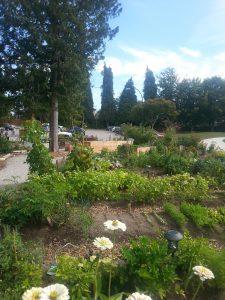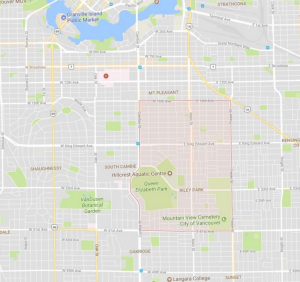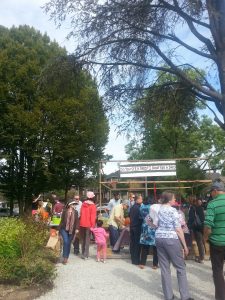If food is a human right, which should be free of prejudice, then why are so many hungry? What’s going on with our food system?

When we first arrived at Riley Park early on a Saturday morning, we were all surprised to see the number of people already there. Individual stalls were set up, with vendors selling a variety of foodstuffs, such as fresh local produce, artisanal bread, and gourmet honey. The area was so vibrant, and everyone seemed like they belonged in the community. To one side of the park, we spotted the Community Garden, still looking lush late into the growing season. In our first moments there, we felt a little out of place. We didn’t know the community or the dynamics of the garden, but thankfully our community partner, Joanne McKinnon, arrived to make introductions.
When we met with Joanne previously, she had introduced the goals of the project. Our overall aim is to use available resources to strengthen relationships in the Little Mountain Riley Park community by promoting awareness of food security issues. In order to give this abstract goal some shape, Joanne had the idea of constructing a produce library–an outdoor wooden structure that will be able to house extra fruits and vegetables that can be taken from or donated to as people need– at the Community Garden as the centerpiece of our project. In addition to helping assemble it, we will be animating the produce library so that it is attractive, informative, and representative of the community’s needs. During the process, we will also try to come up with other strategies that will share information about food literacy and promote existing and future services effectively.

After our introductions at the garden, we were able to see the resources available for the project. Some assets include the community garden fieldhouse, which is a small facility with storage space and a little kitchen, a garden space that hosts educational, food-related events, and the enthusiastic volunteers who meet at the garden every Saturday. We had ideas of how to approach our project, which is centered on increasing food literacy and security; however, we were not exactly sure how to get started.
But where there is uncertainty, there is also opportunity: Sirolli said that no great business was started by one person (TED, 2012), so working with each other on a project is both appropriate and rewarding. As a group, we share a collective interest in working closely with the community, and though we each had our own motivations for choosing this project, one common reason was being able to foster a community at Riley Park. Between the six of us, our initiative, and the resources at hand, we assumed we had a powerful force for change. However, after our meeting with Joanne, we realized that our actions would only represent a small part of the change we sought to establish. Sirolli’s TED talk (2012) reminded us that it takes a group to successfully see change, not one single person. It didn’t occur to us at the time that our group of six was in many ways no more effective than an individual. To see some level of reform in our food system, there needs to be more active members engaging.

This realization does not make us feel hopeless or insignificant. However, as a group of six, we know that by being resourceful and reaching out to our community, local change is possible. We will apply some concepts of Asset-Based Community Development (ABCD), specifically that “everyone has something to contribute” and that “meaningful engagement occurs through dialogue and active listening among community members” (Valley, 2017), which is evident by the relationships we have built with the volunteers and our openness in receiving their feedback. While in the community, we also hope to look at the produce library through a food justice lens. Everyone has the right to food, yet due to the current inequalities of the food system it is not being implemented. It’s important to think about social and political factors that influence an individual’s access to food. Complex issues of why people are hungry and why our food system is they way it is forces us to look at our history to understand our current situation. This interrelated issue of hunger concerns food justice. Food justice is the right to food, recognized in the Universal Declaration of Human Rights as a human right in 1948 (United Nations, n.d.). It is clear that our food system has failed those a part of our target population at Riley Park. Consequently, a hunger gap occurred. Initiatives such as our project are only temporary solutions that try to mask a larger systemic issue.
Temporary solutions also extend to food banks, such as the UBC – AMS Food Bank where one of our group members, Alisha, is an article contributor on the Food Bank blog. On the blog, we aim to cater to our audience as much as possible. We share recipes that we believe require appropriate tools and nutrition information framed in understandable and non-scientific language. However, there demands to be more political involvements, funding and attention around these issues in order for people’s lives to change such as those in our Riley Park target population.
Our produce library is a small, yet important step to contribute to closing the hunger gap locally. While we work on our project this term, we will continue to write about our goals, progress and outcomes.
References:
Mathie, A., & Cunningham, G. (2003). From clients to citizens: Asset-based CommunityDevelopment as a strategy for community-driven development. Development in Practice, 13(5), 474–486. Retrieved from: https://login.ezproxy.library.ubc.ca/login?qurl=http%3a%2f%2fwww.tandfonline.com%2fdoi%2fabs%2f10.1080%2f0961452032000125857
TED. (2012, November 26). Ernesto Sirolli: Want to help someone? Shut up and listen! [Video file]. Retrieved from: https://www.youtube.com/watch?v=chXsLtHqfdM
United Nations. (n.d.). Universal Declaration of Human Rights: The Universal Declaration of Human Rights. Retrieved from http://www.un.org/en/universal-declaration-human-rights/
Valley, W. (2017). Session 2 – Food Justice + Asset Based Community Development. Retrieved from: http://lfs350.landfood.ubc.ca/session-notes/term-1-session-notes/session-2/